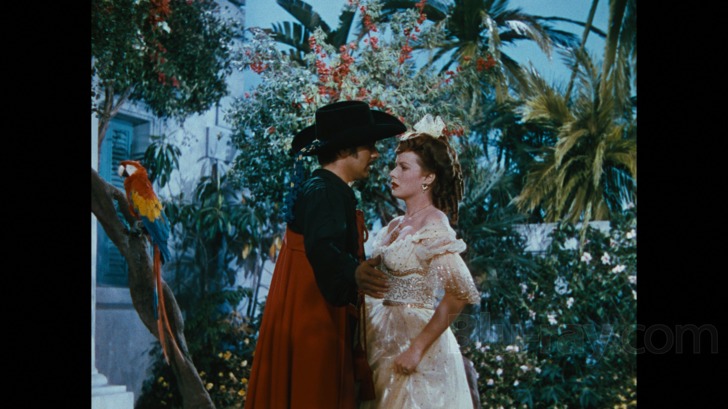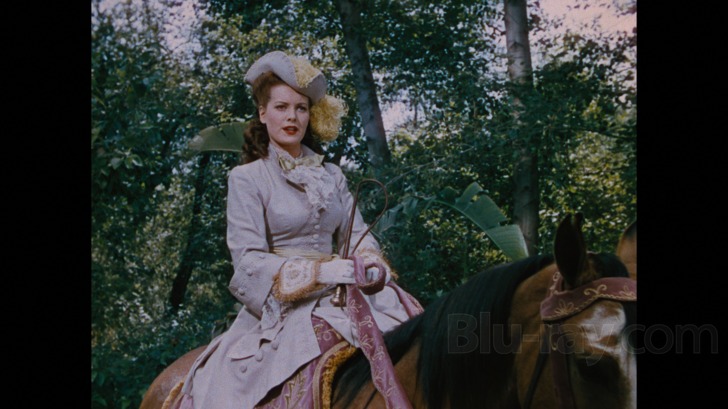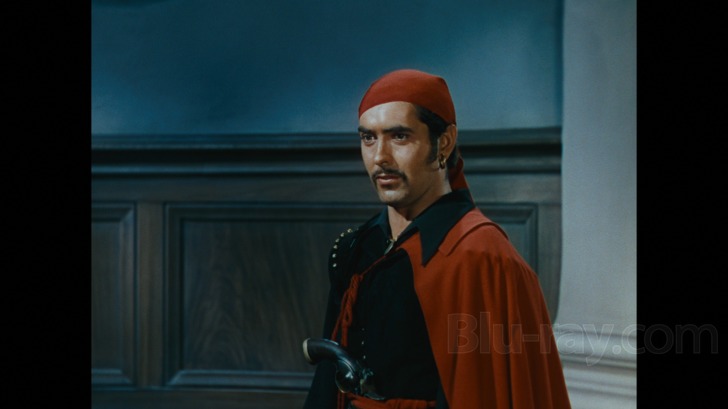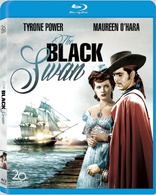The Black Swan Blu-ray Movie
HomeThe Black Swan Blu-ray Movie 
Fox Studio Classics20th Century Fox | 1942 | 87 min | Not rated | Dec 03, 2013
Movie rating
6.9 | / 10 |
Blu-ray rating
| Users | 4.0 | |
| Reviewer | 3.0 | |
| Overall | 3.3 |
Overview
The Black Swan (1942)
Recently reformed pirate Jamie Boy is supposed to be helping the new Governor of Jamaica, Captain Morgan, rid the Caribbean of black-hearted buccaneers. But when Jamie falls head over keel for the heavenly but hotheaded Lady Margaret, he gives caution the heave-ho, kidnaps Margaret and sets sail for the adventure of a lifetime!
Starring: Tyrone Power, Maureen O'Hara, Laird Cregar, Thomas Mitchell (I), George Sanders (I)Director: Henry King
| History | Uncertain |
| Drama | Uncertain |
| Adventure | Uncertain |
| Family | Uncertain |
| Action | Uncertain |
Specifications
Video
Video codec: MPEG-4 AVC
Video resolution: 1080p
Aspect ratio: 1.33:1
Original aspect ratio: 1.37:1
Audio
English: DTS-HD Master Audio Mono
Spanish: Dolby Digital Mono
French: Dolby Digital Mono
Subtitles
English SDH, Spanish
Discs
25GB Blu-ray Disc
Single disc (1 BD)
Playback
Region free
Review
Rating summary
| Movie | 3.5 | |
| Video | 3.0 | |
| Audio | 3.5 | |
| Extras | 2.0 | |
| Overall | 3.0 |
The Black Swan Blu-ray Movie Review
What did the pirate say when Fox threw away its original Technicolor elements? Aaargh.
Reviewed by Jeffrey Kauffman December 5, 2013Maureen O’Hara was supposed to have made her on screen debut pairing with Tyrone Power in Fox’s Son of Fury, which shot throughout mid- to late 1941 and which premiered on January 1, 1942. O’Hara was initially cast as Isabel, cousin to Ty’s Benjamin Blake, the putative but duplicitous romantic interest for the film’s hero (yes, kissin' cousins indeed) until Gene Tierney’s island girl Eve entered the picture. Shortly after having been cast in the role, however, O’Hara came down with appendicitis and had to be replaced (in a kind of comedy of errors, her replacement, Cobina Wright, Jr., developed health issues of her own and was ultimately replaced by Frances Farmer, who gave a splendid performance in the film and then promptly dove off the deep end, spending the rest of the decade in and out of various mental institutions—which may indicate that Son of Fury was not conducive to its actors’ physical or mental health). Power and O’Hara were soon reteamed after O’Hara’s recovery in another Fox film which had actually been on the drawing board at least as long as Son of Fury had, but which for various reasons did not really get under production until 1942, and this time the teaming took. The Black Swan is based on a novel by Rafael Sabatini, whose work provided the sources for a number of classic swashbuckling films that appeared both before (The Sea Hawk, Captain Blood) and after (Scaramouche) this particular film. Like many of Sabatini’s other offerings, The Black Swan touches upon real historical elements (albeit in a highly fictionalized way) while also providing exotic locations and characters galore. Power, for all of his popularity during his heyday (and he was Fox's biggest male star during this period), simply didn’t have the same level of machismo that Errol Flynn, who became famous in a couple of those other Sabatini adaptation, did. Power had an almost feminine beauty, and he often seemed too much of a pretty boy to authoritatively pull off rougher hewn characters. That may be one reason why The Black Swan, for all its pleasures, doesn’t quite kick up the dust in the same way that other Sabatini sparked tales did on the screen. This is still an incredibly lavish Fox production that won an Oscar for its Technicolor cinematography, as well as nominations for its special effects and music, and it’s an enjoyable romp which provides both Power and O'Hara good showcases, while also giving great character actors like Laird Cregar, George Sanders (who had co-starred in Son of Fury) and Thomas Mitchell ample opportunity to not only chew put perhaps even digest large swaths of the very pretty scenery.

Younger partygoers who have a fondness for rum may be fond of Captain Morgan without ever realizing there was indeed a real Henry Morgan, a onetime pirate who became a privateer and ultimately Lieutenant Governor of Jamaica (hence the rum connection). Morgan is a major supporting character in The Black Swan, played by the always enjoyable Laird Cregar. In this formulation, he returns to Jamaica just in time to prevent his former pirate buddy Jamie Waring (Tyrone Power) from exacting revenge on Lord Denby (George Zucco), not to mention kidnapping Denby beautiful daughter Margaret (Maureen O’Hara). (It’s notable that the film shows a rather violent first interchange between Jamie and Margaret, where the boisterous pirate attempts to force his affections on her and then pretty viciously clocks her across the jaw when she bites him.)
It turns out Morgan has gone straight and recruits Jamie and Jamie’s chief aide, the hard drinking Tommy Blue (Thomas Mitchell), to leave pirating behind and help rid the seas of the bad guys as officials of the British throne. Jamie reluctantly agrees, but his main partner, Captain Billy Leech (George Sanders, almost unrecognizable behind heavy makeup and an almost funny red beard and curly hair), isn’t having any of it, and takes off with a gaggle of men to continue his nefarious ways on board his ship, The Black Swan.
Jamie keeps chasing—rather spectacularly unsuccessfully—after Margaret, who has her eyes focused solely on her foppish boyfriend and fiancé Roger Ingram (an uncredited Edward Ashley). Unbeknownst to Margaret, Roger is passing information off to Leech as to where to find treasure laden ships, with the understanding that Leech share the profits with him. Because English ships keep getting scuttled by pirates, the Board of Governors in Jamaica are convinced that Morgan is in on the shenanigans and threatens to have him impeached. Morgan protests his innocence and recruits Jamie and Tommy to man a ship to track down Leech and bring him to justice. A series of cascading events ensues, including Jamie finally successfully kidnapping Margaret (in order to delay Ingram’s return to England to tattle to the King about Morgan) and of course a showdown between Jamie and his former partner Leech.
The Black Swan is never less than enjoyable, and the banter between Power and O’Hara, while fairly politically (and/or sexually) incorrect for modern day eyes, is one of the film’s chief assets. What’s odd about this putative swashbuckler is how little actual swashbuckling takes place. In fact, aside from elements like a couple of one on one battles and another quick montage sequence, there’s really only the big final battle to satisfy action fans. This is really more of a romantic comedy-drama with a pirating subtext. The film is really gorgeously shot by Leon Shamroy (even if this “replication” of the original Technicolor on Blu-ray isn’t quite what it should be), and Henry King stages things effectively and effortlessly. The real color of this film—aside from the lush cinematography—comes from the great supporting cast, which, aside from the aforementioned expert performers, also includes a very young Anthony Quinn as Leech’s right hand (and one eyed) man.
The Black Swan Blu-ray Movie, Video Quality 

The Black Swan is presented on Blu-ray courtesy of 20th Century Fox Home Entertainment with an AVC encoded 1080p transfer in 1.33:1. As Maureen O'Hara mentions in the commentary track, she was actually stunned at what low light levels Leon Shamroy utilized for much of this shoot, as well as his then revolutionary technique of aiming colored gel lights at white walls in order to "paint" backgrounds with colors. Unfortunately, much of that original luster is lost in this high definition presentation from the many times mentioned tragedy of Fox discarding many of their original Technicolor elements in the 1970s. We've seen this same sad situation in previous vintage Fox Technicolor releases like Drums Along The Mohawk, and in some ways The Black Swan looks better—at least relatively speaking—than that film does. Flesh tones are a bit more pleasing and some of the hues—notably purples, blues and yellows, look fairly good, even if they're lacking those beautifully creamy three strip Technicolor highlights (reds, as they so often tend to do in restorations like this, just don't have the original Technicolor pop and look slightly orange or even brown-orange some of the time). The dupe elements here are awfully "contrasty" at times, and unfortunately Shamroy's low light cinematography often ends up looking murky and ill defined, with little if any shadow detail. I'd actually rate this a quarter point or so higher than Drums Along the Mohawk, if only because the brightly lit sequences achieve a minimal pop at times which at least hints at the original three strip Technicolor look. All of this said, this is not a horrible looking transfer, and Fox has no doubt done the best it could with extremely problematic elements. While there may have been some minimal sharpening done (perhaps to help with some of the aforementioned problems), nothing looks overly digital and there is a healthy layer of grain in evidence.
The Black Swan Blu-ray Movie, Audio Quality 

The Black Swan's lossless DTS-HD Master Audio Mono mix can't completely overcome the limitations of that era's recording technologies, especially with regard to Alfred Newman's obviously Erich Wolfgang Korngold inspired score, which sounds a bit boxy and tinny. Dialogue fares much better, with a clean if not expecially boisterous rendering. Given reasonable expectations, no one should be surprised or disappointed with the sound of this track.
The Black Swan Blu-ray Movie, Special Features and Extras 

- Commentary by Rudy Behlmer and Maureen O'Hara. While Behlmer and O'Hara do interact with each other at some points, it sounds to me like their segments were recorded separately from Behlmer's longer, more involved, solo moments (even if Behlmer does offer bridging statements like "If you'll excuse me, Miss O'Hara, I'd like to talk about Henry King for a little while". This is a great commentary full of Behlmer's typically excellent information and some lovely anecdotal reminiscences from O'Hara.
- Theatrical Trailer (480i; 2:02)
The Black Swan Blu-ray Movie, Overall Score and Recommendation 

The Black Swan may not have either the action or romantic energy of some of the other Sabatini inspired films, but that doesn't mean it isn't quite enjoyable on its own merits. Power may not be overly believable as a pirate, but he does just fine in his romantic skirmishes with O'Hara, who is her typically tempestuous self. The supporting cast is one of the chief pleasures here, as is the cinematography of Shamroy and the music of Newman (even if neither quite makes an easy transition to high definition). Recommended.
Similar titles
Similar titles you might also like

The Sea Hawk
Warner Archive Collection
1940

Cutthroat Island
1995

Reap the Wild Wind
1942

The Black Pirate
1926

The Adventures of Robin Hood
1938

The Count of Monte Cristo
2002

Against All Flags
1952

Krakatoa: East of Java
1969

Antony and Cleopatra
Limited Edition to 3000
1972

Captain Blood
1935

That Hamilton Woman
Lady Hamilton
1941

Mutiny on the Bounty
1962

Blood Alley
Warner Archive Collection
1955

Captains Courageous
1937

First Knight
1995

Mutiny on the Bounty
Warner Archive Collection
1935

Captain from Castile
Limited Edition to 3000
1947

The Stolen
2016

Adventures of Don Juan
Warner Archive Collection
1948

The Mark of Zorro
1940
